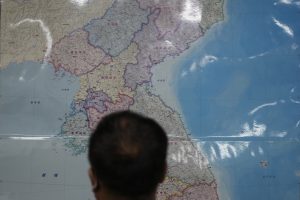Beijing recently passed a new Land Borders Law to “protect territorial sovereignty and land border security” amid long-standing territorial disputes and concerns over the spread of COVID-19. While the law is not likely to change preexisting border security policies, it will impact the safety of refugees residing in China. North Korean refugees, in particular, will face increased challenges as this new law will likely embolden Chinese law enforcement to continue rejecting, detaining, and forcibly repatriating North Koreans attempting to defect.
Despite its status as a signatory to both the 1951 Convention relating to the Status of Refugees and the 1987 Protocol, the Chinese government routinely repatriates North Korean refugees back to North Korea where they face harsh punishments for attempting to defect, ranging from years of forced labor to torture and public execution. Although the main focus of China’s new land law relates to territorial disputes with neighboring countries like India, it also contains specific language applicable to the influx of outside populations: “The state shall take measures to safeguard territorial integrity and land boundaries and guard against and combat any act that undermines territorial sovereignty and land boundaries.” The official codification of a land borders law will provide more domestic justification for the unlawful treatment and repatriation of North Korean refugees crossing the border into China under the guise of “protecting national security.”
Beijing circumvents its legal obligations to protect North Korean refugees by denying them legitimate refugee status, instead labeling them as illegal “economic migrants,” allegedly due to North Korea’s historic food and financial struggles. In reality, Beijing is honoring a 1986 bilateral agreement with Pyongyang outlawing illegal border crossings to legalize the forced repatriation of North Korean refugees. In the past, North Korean refugees have stormed foreign embassies and consulates in China where Chinese police forcibly blocked, and sometimes violently assaulted, North Koreans attempting to apply for political asylum. Notably after North Korean leader Kim Jong Un gained power in 2011, Beijing has increased its anti-North Korean refugee policy through enhanced surveillance technology and border patrol, including law enforcement units tasked to locate, interrogate, and forcibly repatriate North Korean refugees hiding inside China.
Although North and South Korea share a land border of approximately 150 miles (240 kilometers), it is one of most militarized borders in the world, making defection through this route extremely rare and dangerous. North Korea and Russia share a much smaller land border of about 11 miles (18 kilometer), but this route is less preferred compared to China for several reasons: it is a sparsely populated area with limited access to food, employment, and housing; there is a smaller ethnic Korean community to assist with linguistic or legal issues; and it is closer to the heavily guarded Trans-Siberian railroad.
Instead, North Korean refugees often escape through the 880 mile (1,416 kilometer)-long border with China due to easier assimilation into Chinese society via a network of professional smugglers and large communities of Joseon-jok (Chaoxianzu in Chinese), ethnic Koreans who migrated to northeast China during the Japanese occupation of the Korean Peninsula starting in 1910. North Korean refugees have also traversed through China into Mongolia to seek asylum as Seoul has brokered a deal with Mongolian border security to send North Korean refugees to South Korea, instead of forcibly repatriating them to North Korea. However, the searing temperatures and sheer size of the Gobi Desert along the China-Mongolia border is a major obstacle for survival, let alone successful defection.
Therefore, rather by necessity and not preference, most North Koreans risk detection while traveling over 5,000 miles through China into Southeast Asia before reaching a friendly foreign embassy that will recognize their asylum-seeking status.
While international organizations such as the United Nations and Human Rights Watch have urged the Chinese government to change its stance toward North Korean refugees, Beijing is unlikely to buckle under pressure, as it continues to view any influx of refugees as a threat to its national security.
In lieu of drastic diplomatic change between Beijing and Pyongyang, sympathetic governments can support their own civil society groups and NGOs aimed at alleviating the struggles of North Korean refugees resettled within their countries. For example, a Toronto-based human rights organization called HanVoice recently partnered with the Canadian government to launch a private sponsorship program to resettle North Korean refugees, making Canada the third country after South Korea and the United States to accept North Korean refugees, according to the Associated Press. A combination of high-level pressure from foreign governments and steady support for grassroots refugee resettlement organizations and programs is the most practical way to assist North Korean refugees seeking freedom.

































